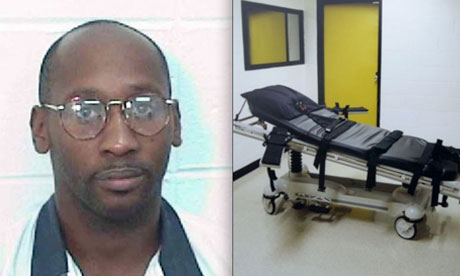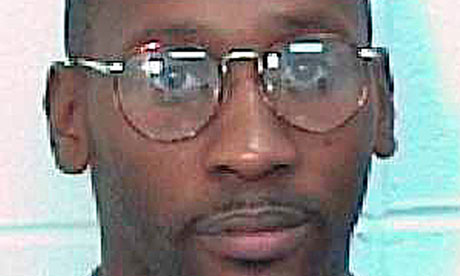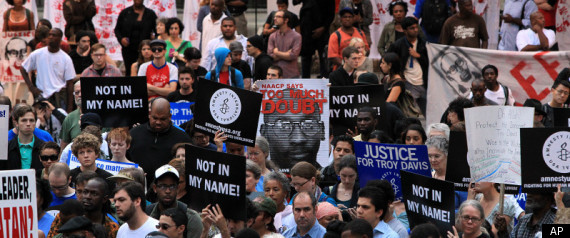In 2007 the Georgia Board of Pardons and Paroles, the body which has the final say in the state on whether executions should go ahead, made a solemn promise. Troy Davis, the prisoner who is scheduled to die by lethal injection at 7pm local time on Wednesday, would never be put to death unless there was "no doubt" about his guilt.
Here are 10 reasons why the board – which decided on Tuesday to allow the execution to go ahead – has failed to deliver on its promise and why a man who is very possibly innocent will be killed in the name of American justice.
1. Of the nine witnesses who appeared at Davis's 1991 trial who said they had seen Davis beating up a homeless man in a dispute over a bottle of beer and then shooting to death a police officer, Mark MacPhail, who was acting as a good samaritan, seven have since recanted their evidence.
2. One of those who recanted, Antoine Williams, subsequently revealed they had no idea who shot the officer and that they were illiterate – meaning they could not read the police statements that they had signed at the time of the murder in 1989. Others said they had falsely testified that they had overheard Davis confess to the murder.
3. Many of those who retracted their evidence said that they had been cajoled by police into testifying against Davis. Some said they had been threatened with being put on trial themselves if they did not co-operate.
4. Of the two of the nine key witnesses who have not changed their story publicly, one has kept silent for the past 20 years and refuses to talk, and the other is Sylvester Coles. Coles was the man who first came forward to police and implicated Davis as the killer. But over the past 20 years evidence has grown that Coles himself may be the gunman and that he was fingering Davis to save his own skin.
5. In total, nine people have come forward with evidence that implicates Coles. Most recently, on Monday the George Board of Pardons and Paroles heard from Quiana Glover who told the panel that in June 2009 she had heard Coles, who had been drinking heavily, confess to the murder of MacPhail.
6. Apart from the witness evidence, most of which has since been cast into doubt, there was no forensic evidence gathered that links Davis to the killing.
7. In particular, there is no DNA evidence of any sort. The human rightsgroup the Constitution Project points out that three-quarters of those prisoners who have been exonerated and declared innocent in the US were convicted at least in part on the basis of faulty eyewitness testimony.
8. No gun was ever found connected to the murder. Coles later admitted that he owned the same type of .38-calibre gun that had delivered the fatal bullets, but that he had given it away to another man earlier on the night of the shooting.
9. Higher courts in the US have repeatedly refused to grant Davis a retrial on the grounds that he had failed to "prove his innocence". His supporters counter that where the ultimate penalty is at stake, it should be for the courts to be beyond any reasonable doubt of his guilt.
10. Even if you set aside the issue of Davis's innocence or guilt, the manner of his execution tonight is cruel and unnatural. If the execution goes ahead as expected, it would be the fourth scheduled execution date for this prisoner. In 2008 he was given a stay just 90 minutes before he was set to die. Experts in death row say such multiple experiences with imminent death is tantamount to torture.



